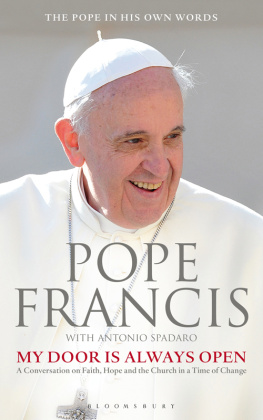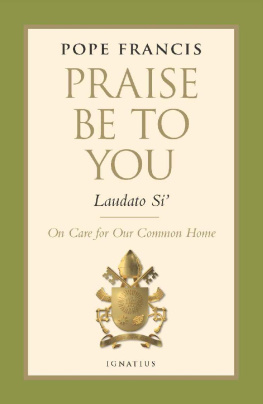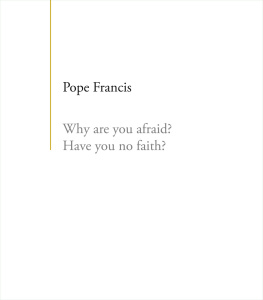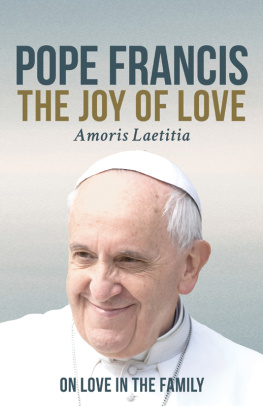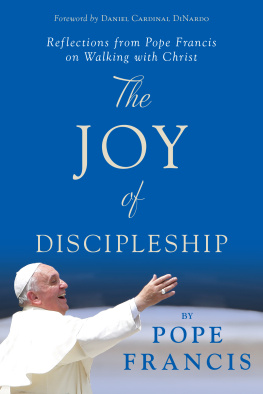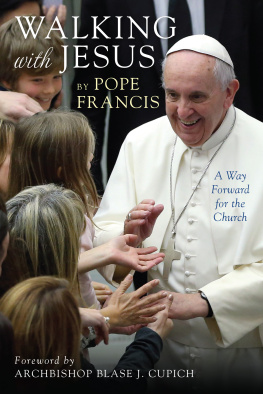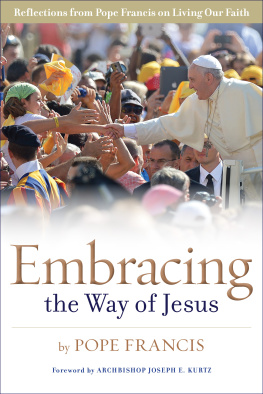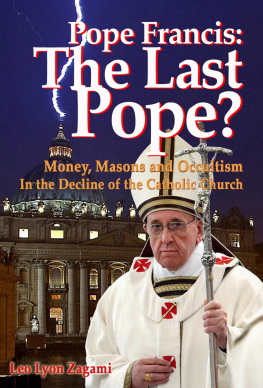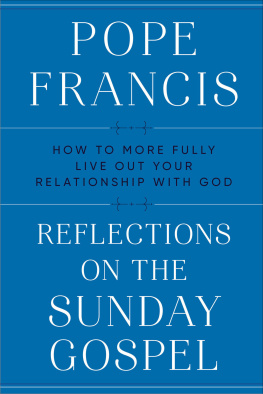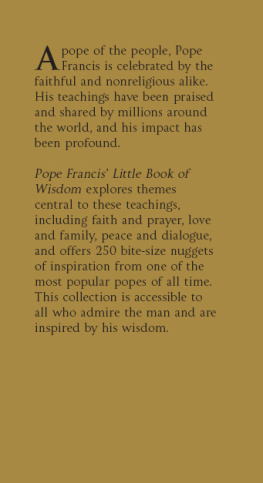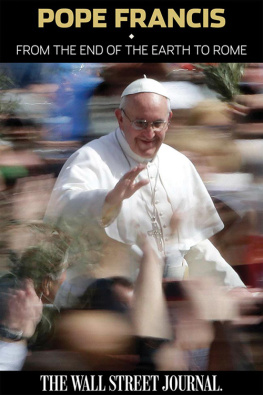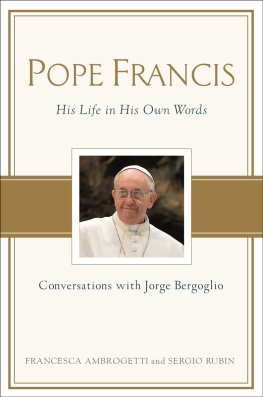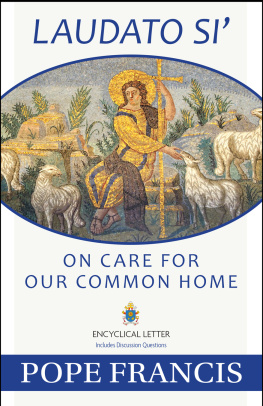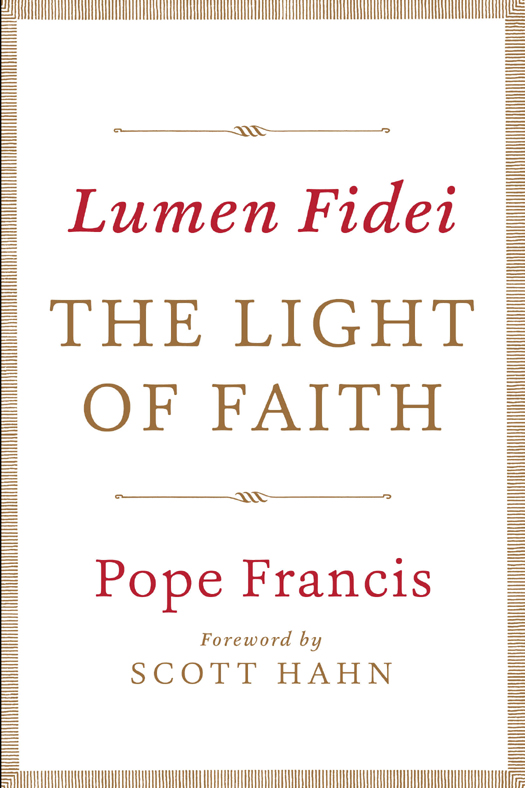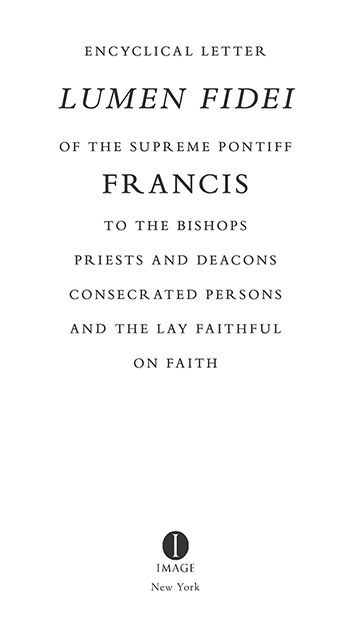Copyright 2013 Libreria Editrice Vaticana
All rights reserved.
Published in the United States by Image,
an imprint of the Crown Publishing Group,
a division of Random House LLC,
a Penguin Random House Company, New York.
www.crownpublishing.com
IMAGE is a registered trademark and the I colophon is a trademark of Random House LLC.
Library of Congress Cataloging-in-Publication Data is available upon request.
ISBN 978-0-8041-8585-1
eBook ISBN: 978-0-8041-8586-8
Cover design by Jessie Sayward Bright
v3.1
CONTENTS
FOREWORD
The encyclical letter Lumen Fidei is the great monument of the Year of Faith declared by Pope Benedict XVI and brought to completion by Pope Francis. It is a capstone of the year, but at the same time a milestone of a long road, a road we have only begun to travel: the road of the New Evangelization.
The issue date of the encyclical is June 29, 2013, the same day as the Feast of Saints Peter and Paul, the two principal evangelizers of the first century. It is a fitting date for the Church to receive an encyclical letter from the hands of two principal evangelizers of the twenty-first century, Francis and Benedict XVI. For Pope Francis has spoken of the letter as the work of four hands, his own and those of Benedict.
These considerations on faith are meant to supplement what Benedict XVI had written in his encyclical letters on charity and hope. He himself had almost completed a first draft of an encyclical on faith. For this I am deeply grateful to him, and as his brother in Christ I have taken up his fine work and added a few contributions of my own. The Successor of Peter, yesterday, today and tomorrow, is always called to strengthen his brothers and sisters in the priceless treasure of that faith which God has given as a light for humanitys path.
Peter and Paul were remarkable men, model Christians, and model evangelizers; they were, however, very different from one another. They differed in personal style, temperament, pastoral methods, and theological approach. Yet their differences were complementary. Their collaboration with one another and their cooperation with grace launched one of the most remarkable transformations in human history: the conversion of the world to Christ.
And the men who produced Lumen Fidei bid us to have no doubt that that conversion has happened and continues to happen. We hardly notice, but we live in a society whose standards, principles, and ideals emerged from Christian faith and depend upon Christian faith as their foundation. Human rights, womens rights, childrens rights, the abolition of slavery, world peace, morality in combat, universal health care: these ideals did not arise spontaneously in the pre-Christian mind. They represent the practical application of the Gospel to everyday life and the social order. The encyclical reminds us of this and worries over the future of these standards in an increasingly secularist, post-Christian society. Lumen Fidei offers us the sobering words of the Anglican poet T. S. Eliot, written in the early 1930s.
Do you need to be told that even those modest attainments
As you can boast in the way of polite society
Will hardly survive the Faith to which they owe their significance?
The dangers to the world today are real as real as were the moral dangers to the first-century GrecoRoman world and they are realistically presented in Lumen Fidei. Yet the tone of the encyclical is serene. Francis, like Benedict before him and like Peter and Paul so long ago know that they write in an extraordinary time of grace, dependent on the power of grace, which is indeed all-powerful, omnipotent.
The encyclical is about faith, but it reflects the character and emphases of our two popes. We could sum their common concern up in two words: truth and love.
Benedict spent his pontificate teaching a love of the truth and warning the modern world that there can be no freedom apart from truth. He wrote two encyclicals on love.
In the few months of his pontificate before his publication of Lumen Fidei, Francis exemplified these principles in his actions. He has startled the media (and even seasoned churchmen) with his plainspoken, spontaneous statements. He doesnt varnish the truth, or spin it, or gild it. He speaks it, and he can deliver it bluntly and memorably. He is a pope of homespun wisdom, street smarts, and ready wit.
Francis embodies Benedicts ideal of truth, but also of love. He goes beyond formality and breaks protocol because of a love that overflows and cannot be contained. He will be remembered as the pope who returned in person to settle up his hotel bill and say goodbye to the staff at the front desk. He is the pope who delights in the press of the crowd, the hugs of children, and the company of the poor and the sick. He is the pope who lives in a hotel room and shares meals with the other guests and staff. He is the pope who, with his actions as well as his words, urges us not to turn charity into philanthropy, or worse into an abstract concept, or into a mere duty to send monetary contributions long distance. He worries most, it seems, about faith that thinks it can flourish apart from contact with the poor and the sick.
The encyclical emphasizes continuity. The encyclical emphasizes succession. And truth and love are what the Church passes on through its forms, its sacred tradition, and its offices. Truth and love are like the family DNA of the Catholic Church. They manifest themselves beautifully in the diverse lives of the saints and in the words of the popes, especially the saints and popes who appear so different from one another in style and temperament. Outside the Church, diversity leads to disunity. Inside the Church, as inside a home, differences deepen and enrich the unity of the family bond.
Apart from the Church, the modern world has sought not continuity, but rupture a decisive break with the past. Lumen Fidei speaks of humanity come of age, proud of its rationality and anxious to explore the future in novel ways. Its exemplars, however, are the nihilist philosopher Nietzsche and his sister Elisabeth, who ended their days in dissolution, anger, and madness. Modernity, and especially modern science, can map the genome and split the atom, but cannot reach any satisfying conclusions about the meaning and order of the atoms and the cells. The empirical sciences cannot explain love (except as biochemical processes) and cannot overcome death (not even by extending earthly life indefinitely).
Faith affirms the findings of science, but seeks their ultimate order and meaning in truth and in love. Our author returns repeatedly to the language of love, the language of family. In a letter that is relatively short (for an encyclical), Pope Francis uses the word sonship thirty-nine times, father thirty-seven times, child seventeen times, family eight times, brother thirteen times and sister seven. Marriage appears as an icon of love. Through the sacrament of family, God reveals himself to us in faith.
Faith and reason, thus, are complementary. Even in an age of great leaps forward in science and technology, it is faith that accomplishes what reason cannot. It leads us to love and thus to commitment.
Far from divorcing us from reality, our faith in the Son of God made man in Jesus of Nazareth enables us to grasp realitys deepest meaning and to see how much God loves this world and is constantly guiding it towards himself. This leads us, as Christians, to live our lives in this world with ever greater commitment and intensity. ()


